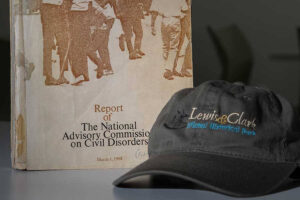A snowy morning in late January turned surreal. I was in the basement of St. Mary’s Seminary in Roland Park, where the archdiocesan archives are maintained, sifting through back issues of the Catholic Review for material pertinent to Archbishop William E. Lori’s new pastoral letter, then a work in progress.
The front page of the Review dated April 5, 1968, was dominated by a similar work, a letter from Cardinal Lawrence Shehan on the subject of racism. That issue went to press before the previous day’s assassination of Dr. Martin Luther King Jr., the inspiration for Archbishop Lori.
The Easter 1968 pastoral letter begins with citations from the “Report of The National Advisory Commission on Civil Disorders,” better known as the Kerner Report.
Archbishop Shehan quotes from the report: “The commission finds that certain basic factors are clear: ‘Of these, the most fundamental is the racial attitude and behavior of white Americans toward black Americans. Racial prejudice has shaped our past and threatens to affect our future.’ ”
My father contributed to that 425-page report. I inherited his copy. The first passage he underlined is on page 4: “White racism is essentially responsible for the explosive mixture which has been accumulating in our cities since the end of World War II.”
President Lyndon Johnson commissioned the report in 1967, in response to urban riots across the country. Submitted in March 1968, it made strong recommendations regarding improved educational, employment and housing opportunities for black Americans.
Johnson ignored its findings.
My father did not.
The lore of my childhood includes the “Colonel” – his rank when he retired from the U.S. Army – leaving a patriotic fraternal organization because it would not accept blacks. He led a household that lived by this ethos: You’re no better than anyone else – and no one else is better than you.
My brother Kevin married Linda, a Jewish girl. My sister Sharon married Bernd, a German. His father had been conscripted into military service for Hitler’s Third Reich. Their son, Joe, married Nana, a native of Ghana.
All that framed my reading of Archbishop Lori’s pastoral letter, one that made me consider my actions – and inaction.
The pastoral’s questions for discussion and reflection include:
- “Do I participate or take pleasure in the culture of ridicule and entrapment?”
- “How do I respond when my witness to truth is rejected or ridiculed?”
Last August, the City of Baltimore removed from Mount Vernon Place a statue of Chief Justice Roger B. Taney, author of the Dred Scott decision, which in 1857 said that African-Americans could never become U.S. citizens.
Walking up Charles Street that afternoon, I encountered a team from The Sun following the story. It included photographer Ken Lam, an Asian-American, who provided the cover photo for my first book, an image of Juan Dixon, a black man who went to Calvert Hall.
I embraced Ken, noted that it was a good day, returned to the office, removed my ball cap and noticed it was from a Lewis and Clark historical site in Oregon, which squashed my smugness.
Oregon, one of my favorite destinations, was founded on the exclusion and persecution of blacks. Lewis and Clark were brilliant explorers, but their role in Manifest Destiny includes the decimation of Native American peoples.
Born in Calvert County, Taney was a Catholic of his time. Recently I met a Catholic who was familiar with my livelihood, but not my family. His banter included mocking blacks and Jews. I did not speak up and object.
Next time, I will, with Archbishop Lori’s pastoral as a guide. Under direct action, he asks that “our public statements, in whatever form they take must be reasoned, constructive and civil.”
Email Paul McMullen at pmcmullen@CatholicReview.org.
